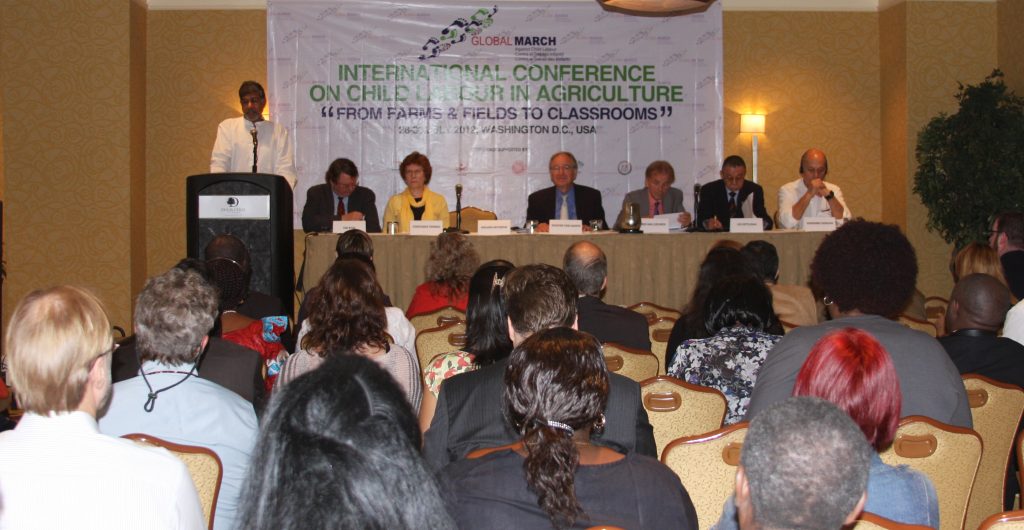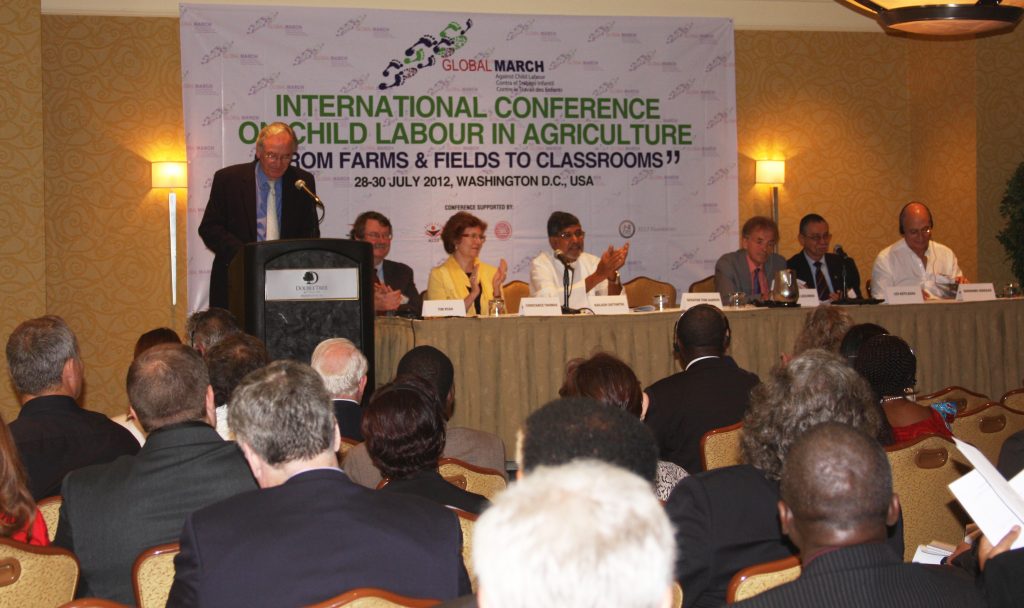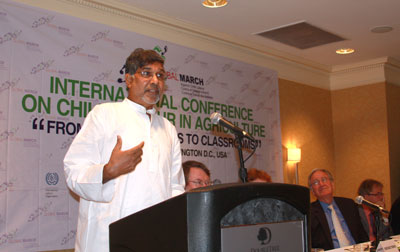July 30, 2012, Washington DC; In response to Kailash Satyarthi, Chairperson of Global March Against Child Labour’s closing question on, “Can we have child labour free agricultural products and commodities?” the 159 participants from 39 countries at the International Conference on Child Labour in Agriculture, in Washington DC, USA, chanted YES WE CAN “Si, se puede”.
The delegates of the conference for two and half days discussed and explored how to better support farmers especially small scale farmers , agriculture workers, and their families, so that these workers and their families can earn decent living and send their children to schools. The participants shared ideas to encourage youth, who are of the legal age in their country, to work on farms and plantations, with safe and healthy conditions; and to also ensure that agriculture becomes a job that youth want to work in and not see as dirty and dangerous.
To make agriculture child labour free and to better support these groups, the conference adopted the Framework for Action. The Framework spells out the priorities for Global March members- trade unions, teacher unions and civil society organisations and calls on governments and the other stakeholder groups in agriculture – agricultural producer organisations, cooperatives, intergovernmental organisations and agencies, nongovernmental organisation, companies and multinational enterprises – to increase their efforts to eliminate child labour in work places and supply chains.
Some of the key actions which Global March members and partners committed to in the framework are:
Bringing farmers and their organisation and agriculture cooperative producers fully into the worldwide movement against child labour so that they can be encouraged and supported in their efforts to stop using child labour on their farms.
Combating the use of child labour in agriculture supply chains by working with trade unions and cooperation’s to help agriculture producers in the supply chain.
By working with teachers organisations etc to ensure that there are enough schools and trained and well paid teachers in rural areas so that girls and boys living there can go to school and are properly educated.
Work with farmers to improve health and safety condition on their farms to reduce accidents, ill health; and to ensure that youth who are of legal age for employment in their country can work on the farms under decent conditions.
To find ways to make agriculture more attractive to youth (of legal age for employment ), better paid , safer and healthier work so that youth sees working in agriculture as worthwhile and not as they often see it as – dirty , dangerous and dead-end.
To engage with campaigns and organisations advocating for the right to food to include child labour elimination as a key indicator of the right to food.
Senator Harkin opens the Global March’s International Conference on Child Labour in Agriculture
The First International Conference on Child Labour in Agriculture was opened by Senator Tom Harkin (D-Iowa). Pathbreaking conference to
tackle the urgent problem of child labour in agriculture. Organized by the Global March Against Child Labour, a worldwide movement of NGOs, trade unions including teachers trade unions. Senator Harkin said the campaign on child labour in agriculture had started with DENIAL, moved onto AWARENESS-raising, and now was the time for more action leading to ABOLITION.
The three day conference is being attended by 160 participants from 40 countries with representatives from the governments, international labour and development organizations, trade unions, employers organizations, corporations, multi stakeholders initiatives, national and international coalitions.
Senator Tom Harkin said that the fight against exploitative child labour should be the centrepiece of all the development financing from the IMF and The World Bank. All financing commitments from the international financial institutions should be critically linked to credible commitments from the national governments to provide economic and social protection to the poor and ensuring each child is brought to schools from the farms and fields. He further added that we need less military spending and more schools with substantial increases in hiring of the teachers to meet the critical shortages of trained and well-paid teachers in every classroom.
The South African representative the “Let me be a child” campaign, with meetings held in Limpopo province expressly to highlight the problem of child labour in agriculture.
Mr. Kailash Satyarthi, Chairperson Global March expressed anger, anguish on the slow progress made in elimination of child labour in worst forms. He said that 2016 deadline to eliminate worst forms of child labour is fast approaching and we do not have a results based plan for each country. He also expressed the dissatisfaction on the poor support to the civil society to have the means to compel the national governments in monitoring their efforts and keeping the national attention focussed. He said the fight against child labour is weakened if there is no commensuration support to strengthen the global movement against child labour.
He also demanded from the multinational corporations not to hide behind some modest initiatives on CSR so as to escape attention from their poor institutional ability to monitor prevalence of the exploitative child labour. He also said that the Corporations cannot place the blame on supply chains being effectively out of their control and excuse, deflect attention from their responsibility. He said that the respect to the laws of land, core international labour standards, engaging civil society in monitoring of the supply chains and going deeper in to the issue of exploitative child labour should be their prime responsibility.
Geronimo Venegas, Vice President of the IUF trade group representing the workers, called for better ties with agricultural trade unions. The fight against child labour cannot be realised without closer collaboration with the farmers’ organisations.
Fred van Leeuwen, Secretary General, Education International affirmed the commitment of the 30 million strong members of the Union in the fight against child labor in agriculture and demanded time bound action plan for providing schools in rural areas and commitments from the national governments to fill up the 8 million teacher vacancies so that each rural school could be provided with teachers if the goals on child labour in worst forms has to be met by 2016. He appreciated the initiative from the UN Secretary General Ban ki Moon on creating a special group to focus on coordinating various UN agencies work in the field of education and expressed hope that this group will be able to address the problem of the 67 million children who are currently missing out on primary education.
Constance Thomas said that all the participants were “engineers in the process of eliminating child labour.” She highlighted the problem of hazardous child labour, and the fact that developing countries use 25% of the world’s pesticides but have 99% of pesticide poisoning facilities. For the conference, her major question was “how can we make greater progress in eliminating child labour, especially in agriculture?” She called for broadening advocacy, enhancing visibility, and strengthening law and enforcement, and hoped that the discussions at the conference will represent a significant staging post between The Hague and Brasilia conferences.
Once again the loud slogans “Go Go Global March” “ Stop Stop child Labour , We Want Education” and “No more tools in tiny hands we want books, we want toys” were chanted in front of the white house today.
The activists from Global March International Secretariat who arrived in Washington DC for preparations of the upcoming International Conference on Child Labour in Agriculture, 28th-30th July 2012 grabbed the opportunity to participate in demonstration of various civil society groups during the ongoing AIDS conference.
GMACL activists Priyanka, Abha, Purva, Priya and Rohit hurriedly painted some posters and marched across the lawns of white house holding them along with Mr Kailash Satyarthi, Chairperson GMACL. While they were marching the other participants of the other demonstrations not only supported but also joined the team.
Mr Satyarthi said that “Education is the only preventive vaccination for AIDS and can save several people”
This march was most appropriate build up for the upcoming International Conference on Child Labour in Agriculture in Double tree hotel , Washington DC from 28-30th July 2012.


About the Conference
Global March Against Child Labour as a part of its strategic targeting of agriculture as a priority is organising International Conference on Child Labour in Agriculture from 28-30 July 2012 at the Double Tree Hotel in Washington D.C., USA.
According to the new ILO Global Estimate of Forced Labour report 20.9 million men, women and children are the victims. 18.7 million (90%) people are in forced labour in the private economy, exploited by individuals or enterprises. Out of these, 14.2 million (68%) are in forced labour exploitation in activities such as agriculture, construction, domestic work and manufacturing.
Agriculture is the sector where, according to latest ILO estimates, around 60% of child labourers around the world work and the problem is not limited to developing countries but occurs in industrialised countries as well. And yet, it remains a sector where limited progress has been made to address child labour and where programmes are under-developed.
There needs to be an improved knowledge base, the introduction of more efficient and effective resources, the implementation of sustainable and long-term programmes and the mainstreaming of child labour across policies, programmes and legislative frameworks. As part of its ongoing efforts, Global March has reached out to agriculture-based multi-stakeholder initiatives, such as the International Cocoa Initiative (ICI) and the Eliminating Child Labour in Tobacco Foundation (ECLT), as well as the International Partnership for Cooperation on Child Labour in Agriculture to enhance knowledge management through sharing models of good practice in subsistence agriculture and strengthening coherence and collaboration between child labour elimination networks and movements. The ILO-IPEC is supportive of Global March’s International Conference on Child Labour in Agriculture.
The Conference will be attended by key partners from UN, inter-governmental, employer, farmer and trade union organisations, civil society organisations and others to share knowledge and capacity, build and strengthen innovative and strategic partnerships and establish a strategic platform of action and follow-up, including for Roadmap 2016 and National Action Plans on Child Labour.



